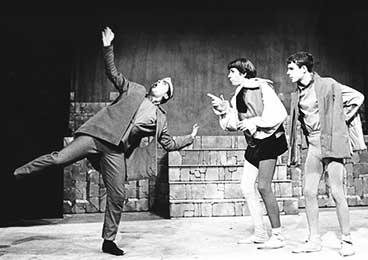
In the spring semester of 1920, a group of undergraduate thespians invited friends to Witherspoon Hall for a handful of performances. Their stage was a dorm-room floor, their curtain a blanket, and at times, the actors “outnumbered the spectators,” as historian Edward W. Borgers wrote in a 1952 article for Educational Theatre Journal. But the upstart company, Theatre Intime — named for the French word for “intimate” — sparked a lasting tradition of student theater at Princeton.
Theatre Intime moved to Murray-Dodge Hall in 1921, and a century later, the 200-seat Hamilton Murray Theater (once a chapel for the Philadelphian Society) remains the company’s home. The Friends of Theatre Intime hoped to gather there last fall to mark the centennial with a special reunion featuring student and alumni performances, panel discussions, social events, and a film festival. COVID-19 has put those plans on hold, but plans for a fall 2021 gathering are moving forward.
In late November, Intime’s current students released their version of As You Like It as a radio play, working together remotely and pouring their energy into sound design and voice acting (listen here). Being away from Murray-Dodge has been difficult, said Eliana Cohen-Orth ’21, the company’s general manager, but the group has maintained its creative ambition. “What’s special to me is how student-driven and how hands-on [Intime] is,” she said.
From its early days, Intime has provided an “independent laboratory for students,” according to Bill Charrier ’69, longtime chair of the Friends of Theatre Intime. As the theatrical counterpart to the irreverent musical comedy of the Triangle Club, the group drew on future stars like Jimmy Stewart ’32, Jose Ferrer ’33, and Josh Logan ’31, all of whom performed on both the Intime and Triangle stages.

By the 1950s and ’60s, Murray Theater was also home to the Princeton Community Players, and Intime itself “looked a lot more like a community theater,” Charrier said. Actors from town, nearby colleges, and local high schools auditioned for roles. Intime members also launched Princeton Summer Theater, which counted Princeton High School student and future Tony winner Bebe Neuwirth as a cast member in the 1970s.
Like many student groups, Intime has endured financial fluctuations, and the Friends group, established in 1988, aims to provide a steadying hand, supporting major purchases such as upgrades to sound and lighting systems.
On a campus that has greatly expanded its artistic offerings in recent decades, Intime remains defined by its role as a student-run, independent theater. Alumnus Geoff Peterson ’69 sees distinct value in the way that Intime students manage every aspect of a theatrical season. “There are lots of opportunities in this world for undergraduates to get their hands dirty in theater — in acting and directing,” he said, noting that at Intime, students must be the producers as well. “You’ve got to raise the money, promote the tickets, sell concessions, and do everything that you have to do to make it profitable.”
Perhaps that is why Intime alumni span such a diverse range of careers in the arts. Producers Roger Berlind ’52, Geoff Rich ’78, and Jordan Roth ’97; playwrights Winnie Holzman ’76, Richard Greenberg ’80, Noah Haidle ’01, and Branden Jacobs-Jenkins ’06; actors John Vennema ’70, Mark Nelson ’77, Lorraine Goodman ’83, Mark Feuerstein ’93, Wentworth Miller ’95, and Ellie Kemper ’02; and Broadway music director Andrea Grody ’11 all contributed their talents to Intime as undergraduates. But as Professor John V. Fleming *63 wrote in an essay for the group’s 90th anniversary, Intime also has made an “enriching contribution to the life and experience of so many students who would never have anything to do with professional theater. The aim of the liberal arts has ever been education as opposed to vocational training, and Intime has made its contribution in those terms.”
